![The Apu Trilogy (Criterion Collection) UK Only [Blu-ray] [2020]](/pictures/1151358.jpg) The Apu Trilogy (Criterion Collection) UK Only | Blu Ray | (25/05/2020)
from £61.98
| Saving you £N/A (N/A%)
| RRP
The Apu Trilogy (Criterion Collection) UK Only | Blu Ray | (25/05/2020)
from £61.98
| Saving you £N/A (N/A%)
| RRP Two decades after its original negatives were burned in a fire, Satyajit Ray's breathtaking milestone of world cinema rises from the ashes in a meticulously reconstructed new restoration. The Apu Trilogy brought India into the golden age of international art-house film, following one indelible character, a free-spirited child in rural Bengal who matures into an adolescent urban student and finally a sensitive man of the world. These delicate masterworks- Pather Panchali (Song of the Little Road), Aparajito (The Unvanquished), and Apur Sansar (The World of Apu)-based on two books by Bibhutibhusan Banerjee, were shot over the course of five years, and each stands on its own as a tender, visually radiant journey. They are among the most achingly beautiful, richly humane movies ever made-essential works for any film lover. Pather Panchali The release in 1955 of Satyajit Ray's debut, Pather Panchali, introduced to the world an eloquent and important new cinematic voice. A depiction of rural Bengali life in a style inspired by Italian neorealism, this naturalistic but poetic evocation of a number of years in the life of a family introduces us to both little Apu and, just as essentially, the women who will help shape him: his independent older sister, Durga; his harried mother, Sarbajaya, who, with her husband away, must hold the family together; and his kindly and mischievous elderly auntie, Indir-vivid, multifaceted characters all. With resplendent photography informed by its young protagonist's perpetual sense of discovery, the Cannes-awarded Pather Panchali is an immersive cinematic experience and a film of elemental power. Aparajito Satyajit Ray had not planned to make a sequel to Pather Panchali, but after the film's international success, he decided to continue Apu's narrative. Aparajito picks up where the first film leaves off, with Apu and his family having moved away from the country to live in the bustling holy city of Varanasi (then known as Benares). As Apu progresses from wide-eyed child to intellectually curious teenager, eventually studying in Kolkata, we witness his academic and moral education, as well as the growing complexity of his relationship with his mother. This tenderly expressive, often heart-wrenching film, which won three top prizes at the Venice Film Festival, including the Golden Lion, not only extends but also spiritually deepens the tale of Apu. Apur Sansar By the time Apur Sansar was released, Satyajit Ray had directed not only the first two Apu films but also the masterpiece The Music Room, and was well on his way to becoming a legend. This extraordinary final chapter brings our protagonist's journey full circle. Apu is now in his early twenties, out of college, and hoping to live as a writer. Alongside his professional ambitions, the film charts his romantic awakening, which occurs as the result of a most unlikely turn of events, and his eventual, fraught fatherhood. Featuring soon to be Ray regulars Soumitra Chatterjee and Sharmila Tagore in star-making performances, and demonstrating Ray's ever more impressive skills as a crafter of pure cinematic imagery, Apur Sansar is a moving conclusion to this monumental trilogy. Special Features: New 4K digital restorations of all three films, undertaken in collaboration with the Academy Film Archive at the Academy of Motion Picture Arts and Sciences and L'Immagine Ritrovata, with uncompressed monaural soundtracks on the Blu-rays Audio recordings from 1958 of director Satyajit Ray reading his essay A Long Time on the Little Road and in conversation with film historian Gideon Bachmann New interviews with actors Soumitra Chatterjee, Shampa Srivastava, and Sharmila Tagore; camera assistant Soumendu Roy; and film writer Ujjal Chakraborty New video essay by Ray biographer Andrew Robinson on the trilogy's evolution and production The Apu Trilogy : A Closer Look, a new program featuring filmmaker, producer, and teacher Mamoun Hassan Excerpts from the 2003 documentary The Song of the Little Road, featuring composer Ravi Shankar The Creative Person: Satyajit Ray, a 1967 half-hour documentary by James Beveridge, featuring interviews with Ray, several of his actors, members of his creative team, and film critic Chidananda Das Gupta Footage of Ray receiving an honorary Oscar in 1992 New program on the restorations by filmmaker :: kogonada New English subtitle translations PLUS: A booklet featuring essays by critics Terrence Rafferty and Girish Shambu
![The Music Room (The Criterion Collection) [Blu-ray] [2017]](/pictures/1143947.jpg) The Music Room (The Criterion Collection) | Blu Ray | (07/08/2017)
from £22.98
| Saving you £N/A (N/A%)
| RRP
The Music Room (The Criterion Collection) | Blu Ray | (07/08/2017)
from £22.98
| Saving you £N/A (N/A%)
| RRP SATYAJIT RAY'S POWERFUL TRAGIC DRAMA A CORNERSTONE OF THE MONUMENTAL DIRECTOR'S CAREER With The Music Room (Jalsaghar), SATYAJIT RAY (Pather Panchali) brilliantly evokes the crumbling opulence of the world of a fallen aristocrat (the beloved actor CHHABI BISWAS) desperately clinging to his way of life. His greatest joy is the music room in which he has hosted lavish concerts over the years now a shadow of its former vivid self. An incandescent depiction of the clash between tradition and modernity, and a showcase for some of India's most popular musicians of the day, The Music Room is a defining work by the great Bengali filmmaker. Special Features: New digital restoration, with uncompressed monaural soundtrack Satyajit Ray (1984), a feature documentary by Shyam Benegal that chronicles Ray's career and includes interviews with the filmmaker, family photographs, and extensive clips from his films New interview with filmmaker Mira Nair New interview in which Ray biographer Andrew Robinson discusses the making of The Music Room and the film's cultural significance Excerpt from a 1981 French roundtable discussion with Ray, film critic Michel Ciment, and filmmaker Claude Sautet New and improved English subtitle translation PLUS: A booklet featuring an essay by critic Philip Kemp as well as reprints of a 1963 essay by Ray and a 1986 interview with the director about the film's music
![Company Limited [DVD] [1991]](/pictures/1105671.jpg) Company Limited | DVD | (10/11/2009)
from £11.59
| Saving you £1.40 (12.08%)
| RRP
Company Limited | DVD | (10/11/2009)
from £11.59
| Saving you £1.40 (12.08%)
| RRP Shyamalendu (Barun Chanda) is a successful executive at a fan company where he is expecting a promotion shortly. His life revolves around his work and socialising with colleagues along with his wife Dolan (Paromita Chaudhuri). His sister-in-law Tutul (Sharmila Tagore) comes to stay with them for a few days. She is given a tour of the life they lead - in restaurants beauty parlours clubs and race courses. But then crisis strikes in the form of agitation at the factory just before the shipment of a prestigious export order and Shyamalendu is held to blame. With the help of a shady labour officer Shyamalendu averts the crisis by declaring a lock-out at the factory after staging a false riot. For his 'efficient' handling of the crisis Shyamalendu is promoted and there is congratulations all around - except from Tutul who has understood the vacuousness of Shyamalendu's world and has hated it. Shyamalendu is left successful and desolate - at the top.
![Charulata (1964) (Criterion Collection) UK Only [Blu-ray] [2021]](/pictures/1154690.jpg) Charulata (1964) (Criterion Collection) UK Only | Blu Ray | (05/04/2021)
from £22.98
| Saving you £N/A (N/A%)
| RRP
Charulata (1964) (Criterion Collection) UK Only | Blu Ray | (05/04/2021)
from £22.98
| Saving you £N/A (N/A%)
| RRP This film about a woman's artistic and romantic yearning by SATYAJIT RAY (The Music Room) is set in late nineteenth-century, pre-independence India. It takes place in the gracious home of a liberal-minded, workaholic newspaper editor and his lonely, stifled wife, Charulata (The Big City's MADHABI MUKHERJEE), whose exquisitely composed features mask a burning creativity. When her husband's poet cousin comes to stay with them, Charulata finds herself both inspired by him to pursue her own writing and dangerously drawn to him physically. Based on a novella by the great Rabindranath Tagore, Charulata is a work of subtle textures, a delicate tale of a marriage in jeopardy and a woman taking the first steps toward establishing her own voice. Special Features: New 2K digital film restoration, with uncompressed monaural soundtrack New interview program with actors Madhabi Mukherjee and Soumitra Chatterjee Adapting Tagore, a new interview program featuring Indian film scholar Moinak Biswas and Bengali literature historian Supriya Chaudhuri Archival audio interview with director Satyajit Ray by film historian Gideon Bachmann New English subtitle translation PLUS: A booklet featuring an essay by critic Philip Kemp and a 1980s interview with Ray by his biographer Andrew Robinson
![Devi (1960) (AKA The Goddess) (Criterion Collection) UK Only [Blu-ray] [2021]](/pictures/1156515.jpg) Devi (1960) (AKA The Goddess) (Criterion Collection) UK Only | Blu Ray | (22/11/2021)
from £22.98
| Saving you £N/A (N/A%)
| RRP
Devi (1960) (AKA The Goddess) (Criterion Collection) UK Only | Blu Ray | (22/11/2021)
from £22.98
| Saving you £N/A (N/A%)
| RRP Master filmmaker Satyajit Ray (The Apu Trilogy) explores the conflict between fanaticism and free will in Devi (The Goddess), issuing a subversively modern challenge to religious orthodoxy and patriarchal power structures. In the waning days of mid-nineteenth-century India's feudal system, after his son (Apur Sansar's Soumitra Chatterjee) leaves for Kolkata to complete his studies, a wealthy rural landowner (The Music Room's Chhabi Biswas) is seized by the notion that his beloved daughter-in-law (The Hero's hauntingly sad-eyed Sharmila Tagore) is the reincarnation of the goddess Kalia delusion that proves devastating to the young woman and those around her. The opulently stylized compositions and the chiaroscuro lighting by cinematographer Subrata Mitra (Charulata) heighten the entrancing expressionistic intensity of this domestic tragedy, making for an experience that is both sublime and shattering. Bonus Features 4K digital restoration, with uncompressed monaural soundtrack Interviews with actors Sharmila Tagore and Soumitra Chatterjee, recorded in 2013 Video essay by film scholar Meheli Sen English subtitle translation PLUS: An essay by film critic Devika Girish
![Five Films by Satyajit Ray (5 Disc Set) [Blu-ray]](/pictures/1127029.jpg) Five Films by Satyajit Ray (5 Disc Set) | Blu Ray | (14/04/2014)
from £N/A
| Saving you £N/A (N/A%)
| RRP
Five Films by Satyajit Ray (5 Disc Set) | Blu Ray | (14/04/2014)
from £N/A
| Saving you £N/A (N/A%)
| RRP Satyajit Ray is internationally acknowledged as one of the great masters of world cinema, with an artistic legacy that ranks as one of the most formidable in all of film history. Exceptionally versatile, his films covered almost every conceivable genre, winning him nearly every major cinema award including an Oscar for lifetime achievement as well as legions of admirers, among them Akira Kurosawa, Henri Cartier-Bresson, V.S. Naipaul and Martin Scorsese. Meticulously restored from the original negatives and presented in high-definition for the first time in the UK, this collection serves as a fitting tribute to one of cinema's most important figures.
![The Apu Trilogy [1955]](/pictures/1005903.jpg) The Apu Trilogy | DVD | (10/02/2003)
from £69.90
| Saving you £-19.91 (N/A%)
| RRP
The Apu Trilogy | DVD | (10/02/2003)
from £69.90
| Saving you £-19.91 (N/A%)
| RRP ""Pather Panchali"": This acclaimed debut by Satyajit Ray is the first part of a trilogy of poetic lyrical works. A boy named Apu is born to a poor but proud Brahmin family. His loving older sister Durga is a sweet girl but has formed the bad habit of stealing fruit from an aunt's orchard much to her mother's dismay. Their father Harihar a poet and lay priest finds a treasury job that will bring the family steady income for the first time in a while. For a brief period afterw
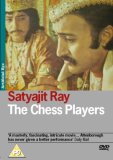 The Chess Player | DVD | (25/06/2007)
from £N/A
| Saving you £N/A (N/A%)
| RRP
The Chess Player | DVD | (25/06/2007)
from £N/A
| Saving you £N/A (N/A%)
| RRP In Satyajit Ray's satirical look at life in Imperial era India two wealthy men indulge in a game of chess to the exclusion of everything else...
![Devi Goddess [DVD]](/pictures/1097090.jpg) Devi Goddess | DVD | (14/09/2009)
from £3.07
| Saving you £8.18 (451.93%)
| RRP
Devi Goddess | DVD | (14/09/2009)
from £3.07
| Saving you £8.18 (451.93%)
| RRP In Goddess (aka: Devi) Doyamoyee is left alone with her husband's ageing father-in-law a devoted follower of the goddess Kali. One evening the aging widower she cares for has a dream that she is an avatar of Kali and must be worshipped. Word spreads and others come to believe that she is an incarnation of the deity. Hearing this alarming news her husband Umprasad returns only to find Doyamoyee herself beginning to believe that she is an avatar; a belief which soon turns to tragedy.
 Abhijan | DVD | (29/05/2006)
from £20.24
| Saving you £-0.25 (N/A%)
| RRP
Abhijan | DVD | (29/05/2006)
from £20.24
| Saving you £-0.25 (N/A%)
| RRP Abhijan was Satyajit Ray's most popular film in Bengal: a ""conscious"" effort to communicate with a wider audience. The project was originally conceived by his friends and Ray stepped in when they panicked at the prospect of directing. Ray's mastery turned a starkly conventional plot into a subtly nuanced story which topped the Bengali box office for months. Set on the Bihar-Bengal border where Marwari businessmen - a powerful Hindi-dialect community of entrepreneurs much disl
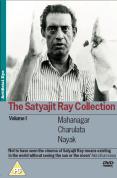 Satyajit Ray Collection Vol.1 | DVD | (25/08/2008)
from £N/A
| Saving you £N/A (N/A%)
| RRP
Satyajit Ray Collection Vol.1 | DVD | (25/08/2008)
from £N/A
| Saving you £N/A (N/A%)
| RRP Satyajit Ray is internationally acknowledged as one of the great masters of world cinema. His films - many of them masterpieces - have won him legions of admirers among them Akira Kurosawa Henri Cartier-Bresson V.S. Naipaul and Martin Scorsese. This box set features the following films: Mahanagar (Aka: The Big City) (1963): Set in the mid '50s Ray's often humorous story of conflicting social values in India's lower-middle class stars Madhabi Mukherjee as a housewife whose growing independence alarms her traditionalist India 1963 family. Charulata (Aka: The Lonely Wife) (1964): Neglected by her ambitious journalist husband the lonely Charulata (Madhabi Mukherjee) befriends his cousin (Soumitra Chatterjee) a sensitive aspiring writer and almost inevitably their feelings for each other begin to deepen. Adapted from a story by Rabindranath Tagore Ray considered this sesnitively realised drama one of his finest achievements. Nayak (Aka: The Hero) (1966): This beautifully observed character study was one of Ray's earliest original screenplays. En route to an award ceremony a famous and egocentric Bengali movie star finds that he is compelled to re-evaluate his life after encountering a disapproving young journalist (Sharmila Tagore).
![The Stranger [DVD]](/pictures/1100053.jpg) The Stranger | DVD | (07/12/2009)
from £10.95
| Saving you £2.04 (18.63%)
| RRP
The Stranger | DVD | (07/12/2009)
from £10.95
| Saving you £2.04 (18.63%)
| RRP The Stranger (Agantuk) sees Anila receiving a letter from a man claiming to be her uncle a man who disappeared 35 years prior. He turns up at her family home professing to be an anthropologist a globally seasoned traveller en route from the United States to Australia. The family are suspicious of the stranger believing him to be an imposter with a financial scam to sell. After a grilling from the family's lawyer he leaves as unexpectedly as he arrives leaving behind a stunned family and some very insightful observations. Widely regarded as one of the greatest auteurs of 20th century cinema and the last of the Bengali renaissance movement begun at the start of the 19th century Satyajit Ray was a giant of Indian cinema. Directing 37 films during his lifetime he was also a critically lauded writer publisher illustrator graphic designer and film critic... as well as recipient of more than 30 Indian National Films Awards a winner of numerous international film festivals - including Berlin Venice and Cannes - and an honorary Academy Award recipient in 1992.
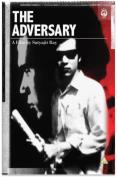 The Adversary | DVD | (22/10/2007)
from £13.05
| Saving you £-0.06 (N/A%)
| RRP
The Adversary | DVD | (22/10/2007)
from £13.05
| Saving you £-0.06 (N/A%)
| RRP In The Adversary a young man newly graduated from college is unable to find meaningful employment. He lives in a crowded apartment with his widowed mother a revolutionary brother and a younger employed sister. Family frictions coupled with his mounting failure to find work place an unbearable strain on him - ultimately causing him to hallucinate. The pressure magnified by the tense and impersonal setting of Calcutta builds to a devastating crescendo.
![Two Daughters [DVD] [1961]](/pictures/1097091.jpg) Two Daughters | DVD | (14/09/2009)
from £9.49
| Saving you £3.50 (26.90%)
| RRP
Two Daughters | DVD | (14/09/2009)
from £9.49
| Saving you £3.50 (26.90%)
| RRP Two Daughters (aka: Teen Kanya) tells two tales. The first is about Nanda a young man who leaves Calcutta to work as a postmaster in an isolated malaria-infested village. His only solace in the village is in teaching his host Ratan how to read and write. The second story is about a student Amulya who returns to his village after finishing his exams. His widowed mother is very anxious for him to marry and has already picked out a girl. Yet he rejects his mother's choice and being forced to choose some girl marries a lively tomboy who is not ready to give up her freedom.
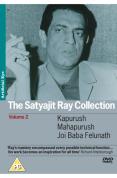 The Satyjit Ray Collection Vol.2 | DVD | (22/09/2008)
from £N/A
| Saving you £N/A (N/A%)
| RRP
The Satyjit Ray Collection Vol.2 | DVD | (22/09/2008)
from £N/A
| Saving you £N/A (N/A%)
| RRP Satyajit Ray's artistic legacy is one of the most formidable in all of film history. Exceptionally versatile his films covered almost every conceivable genre winning him nearly every major cinema award including an Oscar for lifetime achievement. Titles Comprise: Kapurush (a.k.a The Coward) (1965): Stranded in a small town screenwriter Amitabha Roy is astonished to encounter a former lover who is now married to the owner of a tea plantation. Recalling his inability to commit to her and the relationship's resultant breakdown Roy decides to make amends for the past. Mahapurush (a.k.a The Holy Man) (1965): Ray's rarely-seen gem is a comedy-drama in which a gullible and religiously devout retiree is completely taken in by a bogus holy man and enlists the charlatan's help in finding his daughter a husband. But she is being courted by a young man who determines to expose the fraudster. Joi Baba Felunath (1978): Set in the holy city of Benares where Ray had shot Aparajito over 20 years previously this adventure story adapted from Ray's own novel stars Soumitra Chatterjee as a detective investigating the theft of a priceless gold icon.
![Satyajit Ray Collection Vol.3 [DVD]](/pictures/1101477.jpg) Satyajit Ray Collection Vol.3 | DVD | (23/08/2010)
from £N/A
| Saving you £N/A (N/A%)
| RRP
Satyajit Ray Collection Vol.3 | DVD | (23/08/2010)
from £N/A
| Saving you £N/A (N/A%)
| RRP Titles Comprise: Deliverance The Home and the World The Public Enemy
![Charulata [DVD]](/pictures/1121722.jpg) Charulata | DVD | (24/06/2013)
from £21.58
| Saving you £N/A (N/A%)
| RRP
Charulata | DVD | (24/06/2013)
from £21.58
| Saving you £N/A (N/A%)
| RRP ![Charulata [Blu-ray]](/pictures/1121696.jpg) Charulata | Blu Ray | (26/08/2013)
from £26.98
| Saving you £-6.99 (-35.00%)
| RRP
Charulata | Blu Ray | (26/08/2013)
from £26.98
| Saving you £-6.99 (-35.00%)
| RRP Neglected by her ambitious journalist husband the lonely Charulata befriends his cousin a sensitive aspiring writer and almost inevitably their feelings for each other begin to deepen. Adapted from a story by Rabindranath Tagore Ray considered this sensitively realised drama one of his finest achievements.
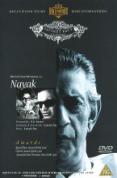 Nayak | DVD | (07/08/2006)
from £N/A
| Saving you £N/A (N/A%)
| RRP
Nayak | DVD | (07/08/2006)
from £N/A
| Saving you £N/A (N/A%)
| RRP Arindam Mukherjee a famous film star is on his way to Delhi to receive an award. The film reveals his not so good mood for his latest flop film & the over published news of his involvement in a club brawl. While travelling Arindam meets an interesting cross-section of his fans. A young attractive editor of a woman's magazine Aditi takes the interview of Arindam not biased by any fanship but rather to make a good saleable copy of it. Later on in the film we come across Arindam's terrifying dream. Though he refused Aditi in the beginning he eventually opens up before her and she realizes the warm and lonely man in him. Out of respect for his frank confession she tears off the sheets of the interview.
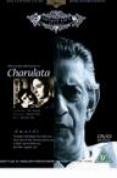 Charulata | DVD | (17/04/2006)
from £N/A
| Saving you £N/A (N/A%)
| RRP
Charulata | DVD | (17/04/2006)
from £N/A
| Saving you £N/A (N/A%)
| RRP Charu lives a lonely and idle life in 1870s India. Although her husband devotes more time to his newspaper than to their marriage he sees her loneliness and asks his brother-in-law Umapeda a would-be writer to keep her company. At this point Bhupati's cousin Amal visits and spends a long vacation and after several months Charu and Amal's feelings for each other move beyond friendship.

Please wait. Loading...
This site uses cookies.
More details in our privacy policy